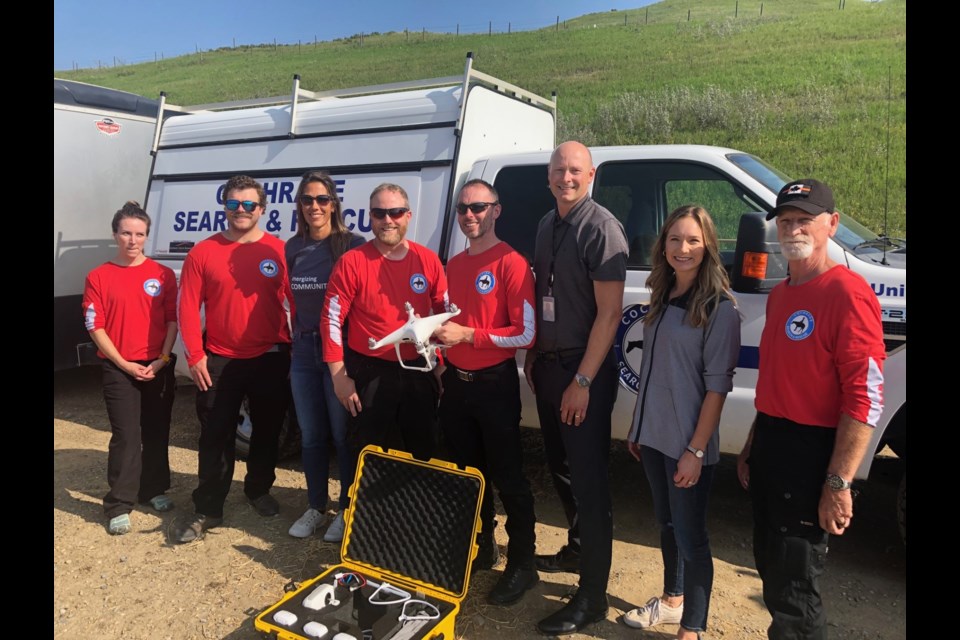TC Energy’s donation of a drone to Cochrane Search and Rescue will be an important addition to the toolbox that local volunteers will use to find lost souls and possibly save lives.
Representatives of the energy company formerly known as Trans-Canada Pipe Lines were at the Cochrane Ag Society grounds on July 24 to hand over the controls of a drone that will be used to help out on future search and rescue operations in the Cochrane area.
Cochrane Search and Rescue (SAR) already has two members who are experienced drone pilots and they will be training more members to be proficient in all the various drone applications.
When Andrew Potton of Cochrane SAR approached the oil and gas corporation for a donation, he didn’t think he would be successful in obtaining a drone.
He laughed as he described the process behind his approach to TC Energy. When making out his wish list for a possible donation, he decided to make a last-minute addition.
“I said, a drone, if you have one . . . I was doing it jokingly, and they ended up donating a drone,” Potton said.
The new addition to the fleet will make a serious difference, according to Potton.
“The drone brings so many different capacities,” he said.
“If we know where the person was last seen, that 300 metres around that area is very critical, so we’ll be able to get the drone up and start monitoring that 300 metres while our resources start to arrive.”
He added if there’s a swamp or crevice that searchers can’t access, the drone will be able to fill the gap.
“That will be super valuable, especially in winter,” he said.
Davin Lindquist, corporate aviation drone manager at TC Energy, was on hand at the Ag Society grounds to oversee the hand-over of the drone.
“We have a fleet of drones we use for emergency response, and we had these older models that we’ve used for training, and we’re happy to contribute them to a worthy cause,” he said.
Cochrane SAR is operated completely by 72 volunteers from a variety of professional backgrounds. Such professions as paramedics, firefighters, police, Potton said, actually represent the minority of the local organization’s membership. The bulk of their members are office workers, oil and gas workers – a cross-section of all types of backgrounds.
When the RCMP gets a report of a missing person and calls SAR, the call then goes out to volunteers to let them know where and when they’ll be meeting.
Search managers then identify the resources available, and a plan gets put into action.
“Typically, we do have a very strong response – between 20 and 30 members,” Potton said. “And that is usually enough for us to search and find the missing person.”
They rely on donations from individuals and corporations like TC Energy to finance their operations, from searches to equipment costs, and all the necessary training.
“Our members do a lot of training – we have high standards,” Potton said.
Besides acting as ‘eyes in the sky’ on difficult search operations where terrain and other factors may compromise on-the-ground approaches, drones can also utilize infrared cameras to locate hot spots that could assist in locating people who may not be able to respond to calls from searchers.
The infrared cameras are commonly used in forest fire-fighting operations, where locating hotspots in the aftermath of wildfires is crucial in preventing possible flare-ups.
It costs about $28,000 a year just for Cochrane SAR to remain operational, so they also have to do a lot of fundraising activities, including applying for grant opportunities.
Potton said at present, SAR’s most pressing need is a new truck – a one-ton – to pull their ATV trailer around. Their current truck has outgrown its usefulness and struggles to keep up.
Donations to Cochrane SAR can be made on their website cochranesearchandrescue.org.




